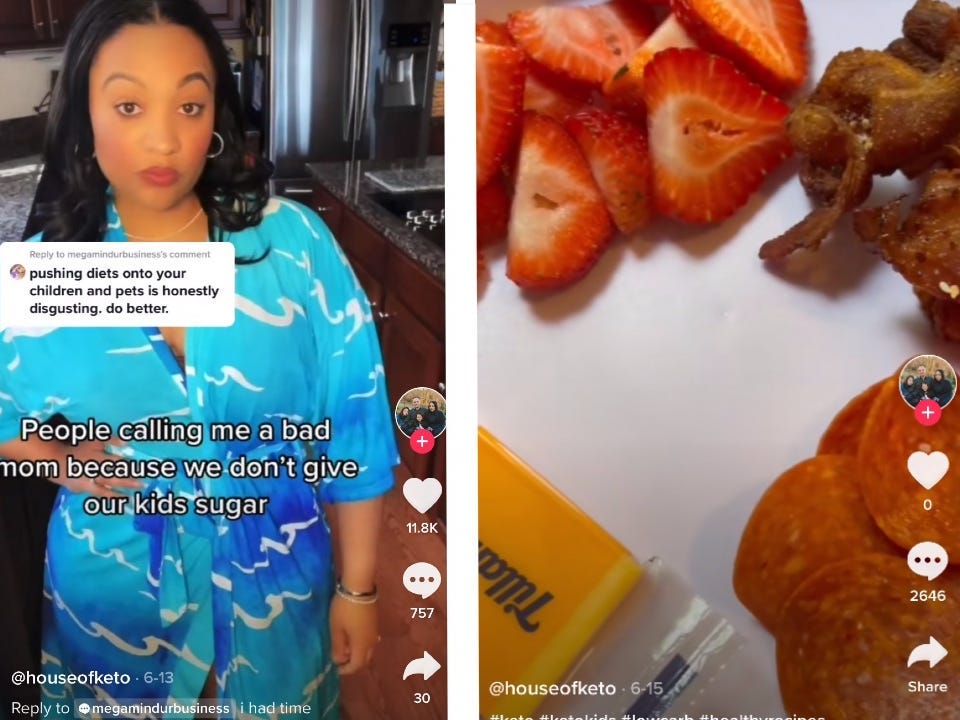
- A popular keto blogger on TikTok faced backlash for sharing the low-carb lunch she prepares for her kids.
- Critics say a keto diet can leave children malnourished or with disordered eating habits.
- Experts say low-carb diets can be risky for kids, but can be done with proper planning and supervision.
- Visit Insider's homepage for more stories.
A popular keto blogger faced backlash for sharing the low-carb lunch she prepares for her kids in a TikTok video.
Abby Durlewanger, who runs a keto lifestyle blog "House of Keto" with her husband Mike, said her children follow a low-carb diet, prompting viewers to question whether keto is risky for growing kids.
Durlewanger previously amassed half a million followers on TikTok sharing low-carb cooking hacks for "butter meat" and bacon.
She told her TikTok followers that her whole family is keto, including the dog. She said she feeds her 11-year-old daughter and 5-year-old son bacon, eggs, and cheese, and limits fruit except as a treat.
Durlewanger immediately had a flood of angry comments and messages accusing her of improperly feeding her children or setting them up for disordered eating.
In response, she said her family was following a healthy lifestyle. Experts say that a low-carb diet for kids is possible, but risky, since restricting certain food groups might leave them without key nutrients for growth and development.
Durlewanger said her kids' keto diet includes meat, cheese, and veggies, with fruit as a treat
Durlewanger doesn't describe everything her kids eat, but keto diets generally involve getting less than 5-10% of your daily calories from carbohydrates, and 70% or more of your calories from fat. More flexible low-carb diets can have up to 20% of daily calories from carbs.
In contrast, pediatricians typically recommend children get around 40-50% of their daily calories from carbs, at least 130 grams per day.
Durlewanger said her kids eat meat, eggs, nuts and sugar-free chocolate. She said her 11-year-old daughter also eats lower-carb produce like cucumbers, peppers, and avocado. Berries are offered as a treat. Foods with sugar, including fruit, as well as candy, are limited to special occasions.
She said her kids' eating style is approved by a pediatrician. Durlewanger and other advocates of keto for children argue that low-carb is healthier than the highly-processed foods in the standard American diet, which include refined carbohydrates and added sugar.
If you're feeding your kids a low-carb diet, experts say to plan carefully
Registered dietitian Rachael Hartley previously told Insider that low-carb diets for kids are concerning if it's done without proper precautions and the help of an expert. Keto can be healthy for kids if the meal plans include whole foods and produce.
"It can be safe but it's incredibly risky, especially when not monitored by a professional," Hartley said.
Glucose, derived from breaking down carbohydrates in food, is an important fuel source for the body and brain, particularly for growing kids. Low glucose levels can cause physical and mental symptoms like fatigue and brain fog which can deprive kids of needed energy for growth, school, and sports, Hartley said.
On a keto diet, the body can produce some glucose, along with ketones, by breaking down fat for energy instead of carbs. Studies have shown the keto diet has been successfully used for children as a treatment for epilepsy, but it's not without side effects, including potentially delayed growth.
Kids on keto are also at risk of dehydration and nutritional deficiencies, including B vitamins, folate, potassium, magnesium, and fiber.
That's because cutting carbs also means limiting healthy food groups like whole grains, fruits, and some veggies. Keto diets can also include foods that are low-carb but not healthy, like processed meat and fast food.
Strict diets can also backfire by creating anxiety or shame around restricted food groups, according to Hartley.
If parents want to model healthy behaviors, good options include eating a variety of whole, unprocessed foods, teaching kids that there are no "bad" foods, and preparing meals together, she said.